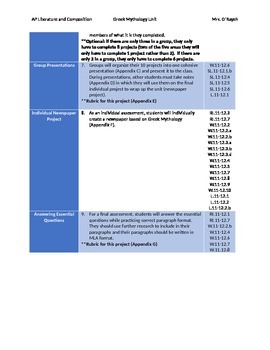AP Literature and Composition Mythology Unit
English on Demand
27 Followers
Grade Levels
9th - 12th, Higher Education, Adult Education, Homeschool
Resource Type
Standards
CCSSRI.11-12.1
CCSSRI.11-12.2
CCSSRI.11-12.3
CCSSRI.11-12.7
CCSSW.11-12.2
Formats Included
- Word Document File
Pages
29 pages
English on Demand
27 Followers
Description
This unit has been compiled for my AP Literature and Composition class for the beginning of the school year to review or introduce them to Greek Mythology, which is often alluded to in literature and some of the questions on the AP Literature exam refer to these allusions.
In order to gain a better understanding of mythology, students begin by discussing the importance of studying Greek mythology before creating group projects that include choices. Students learn about creating and giving professional presentations and then they present their projects to the class in which the audience takes notes to use on an individual project in which the students create mythology newspapers. The unit is wrapped up with an assessment in which the students answer the essential questions using correct MLA format and proper paragraph format that is expected in AP composition.
This unit is 29 pages long, includes the standards covered for each assignment/activity along with an appendix of all of the handouts required.
This unit should take approximately four weeks and could be used and modified for any secondary grade-level.
In order to gain a better understanding of mythology, students begin by discussing the importance of studying Greek mythology before creating group projects that include choices. Students learn about creating and giving professional presentations and then they present their projects to the class in which the audience takes notes to use on an individual project in which the students create mythology newspapers. The unit is wrapped up with an assessment in which the students answer the essential questions using correct MLA format and proper paragraph format that is expected in AP composition.
This unit is 29 pages long, includes the standards covered for each assignment/activity along with an appendix of all of the handouts required.
This unit should take approximately four weeks and could be used and modified for any secondary grade-level.
Total Pages
29 pages
Answer Key
Included with rubric
Teaching Duration
1 month
Report this resource to TPT
Reported resources will be reviewed by our team. Report this resource to let us know if this resource violates TPT’s content guidelines.
Standards
to see state-specific standards (only available in the US).
CCSSRI.11-12.1
Cite strong and thorough textual evidence to support analysis of what the text says explicitly as well as inferences drawn from the text, including determining where the text leaves matters uncertain.
CCSSRI.11-12.2
Determine two or more central ideas of a text and analyze their development over the course of the text, including how they interact and build on one another to provide a complex analysis; provide an objective summary of the text.
CCSSRI.11-12.3
Analyze a complex set of ideas or sequence of events and explain how specific individuals, ideas, or events interact and develop over the course of the text.
CCSSRI.11-12.7
Integrate and evaluate multiple sources of information presented in different media or formats (e.g., visually, quantitatively) as well as in words in order to address a question or solve a problem.
CCSSW.11-12.2
Write informative/explanatory texts to examine and convey complex ideas, concepts, and information clearly and accurately through the effective selection, organization, and analysis of content.





